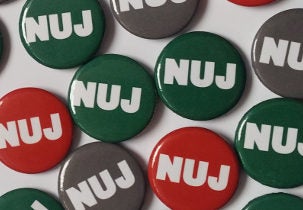
The National Union of Journalists has a budget surplus of £200,000 just six years after declaring it was in a “desperate financial situation”, leading members to vote down a motion to hike membership fees.
The NUJ feared in 2012 that it could run out of money and become insolvent within months after a “perfect storm” of falling income and rising costs.
But by 2016 a recovery plan had turned the union’s finances around, leading to “stability and the build-up of substantial financial reserves”, honorary general treasurer John Barsby said in his financial report – seen by Press Gazette – to the NUJ’s Delegate Meeting on the weekend.
The NUJ’s £200,000 budget surplus was almost £80,000 higher than anticipated last year, Barsby’s report revealed.
But, he said changes in accounting regulations and the impact of the Brexit vote had knocked a notional £1.8m off the value of the union’s main asset – its Headland House headquarters in London.
The building’s offices have all been let with five-year tenancy agreements, with tenants paying their share of business rates and service charges.
This reduces the NUJ’s cost of running Headland House by around £160,000 a year and, from 2019, when full rents will be paid by all tenants, the union will receive an income of £300,000 a year.
The report said: “The feared decline in our membership as hundreds of our journalist colleagues were made redundant did not materialise since recruitment efforts have balanced leavers with joiners.
“In our last year’s budgeting process we had planned a budget surplus of £117,000 based on a possible 2 per cent fall in membership. Instead, we achieved an actual surplus of almost £200,000.
“Now that we have given Headland House, the NUJ’s one core asset, a new lease of life, transforming it into a building that is worth considerably more in value than the money spent on its renovation and, at the same time as creating an income stream from it, the work to rebuild our reserves – as we committed to do in the recovery plan – continues in earnest.”
Following Barsby’s report, a motion to increase the cost of member subscriptions – the first rise hike in four years – failed to secure enough votes to be passed.
Barry McCall, representing the NUJ’s national executive council, said the fee increase was needed to sustain the union’s “essential activity”.
Gerry Carson, from the Irish executive council, said: “We must protect the services available to members,” while Mark Fisher, representing the freelance industrial council, said: “I want a union that is powerful and well resourced.”
Speaking against the motion, Natasha Bernal, from the magazine and book industrial council, said the proposals would “unfairly impact on low-earning members more than the higher paid”.
Chris Wheal, from the London magazine branch, agreed as he called on the NUJ to recruit and organise a mass union which can include low-paid workers, rather than a small union for wealthy journalists.
NUJ general secretary Michelle Stanistreet said: “Last time we met we made changes to our subs structure to introduce a fairer, more transparent system based on earnings, not sectors – something that successive DMs had demanded over many years.”
She added: “It is important to protect our low-paid members, and we already have flexibility and protections, including reduced contributions. There are lots of different and special offers in place.
“We pride ourselves on the level of service given to members, I genuinely believe it is second to none in the trade union movement and that is not a culture I would ever want to see change.”
Members voted for the NEC to bring a motion to the 2020 delegate meeting to introduce an additional grade for higher-waged new members.
Bernal, who seconded the motion, said the principle of the union was “to work together” and that those who earn less should pay less, and those who earn more should pay more.
A further motion instructed the NUJ to organise a study of the likely benefits of offering lower membership subscriptions for first-time joiners and those earning less than £30,000.
Speaking to Press Gazette after the delegate meeting, Seamus Dooley, NUJ assistant general secretary, said officials were “disappointed” they could not secure the subs increase.
“We have managed over the last year to stabilise our finances in very difficult circumstances. That’s been down to prudent management and hard work by a lot of people.
“We are now presented with a significant challenge,” he said, adding that the management team and finance committee accepted the delegates’ decision and would review the union’s financial position.
“It does present problems but we will endeavour to ensure we give the best possible service and we are certainly not going to allow financial challenges to undermine our fight to defend journalism.
“It challenges us in that there are plans we would have had to develop our services but they are now somewhat curtailed.”
Dooley said the NUJ must now increase member contributions by recruitment instead.
Picture: NUJ
Email pged@pressgazette.co.uk to point out mistakes, provide story tips or send in a letter for publication on our "Letters Page" blog
